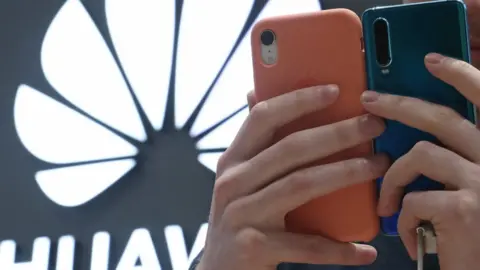Huawei labels US call intercept claims as 'utter nonsense'
 Getty Images
Getty ImagesHuawei has hit back at allegations that it has secret "back doors" into mobile networks around the world, labelling it as "complete and utter nonsense".
US officials told the Wall Street Journal that Huawei had access to law enforcement tools for wiretap-style monitoring of calls.
It comes a day after the US department of Justice unveiled fresh charges against the company.
Huawei said the new indictment had "nothing to do with facts and reality".
The Chinese company makes phones and other popular products - but also builds critical communications infrastructure.
The Wall Street Journal's report this week was about "lawful interception" interfaces, which allow law enforcement with an appropriate court order to monitor communications.
The report alleged that Huawei had secretly given itself the ability to access those tools without mobile phone companies knowing.
Allegations are 'a smokescreen'
John Suffolk, Huawei's global cyber-security and privacy officer, told reporters the idea that Huawei had access to the special "lawful intercept" equipment was completely untrue - and that the company did not even make such devices.
"We have no access to this equipment, we don't know what call or information is being intercepted, we don't know when it is intercepted. All we do is provide one side of the box which is blind to what's happening on the other side of the box," he said.
He said that the devices were so sensitive that they were "watched like a hawk" by the mobile phone operators - often being placed in a special, secure room.
"I'm not aware of any operator who has said to Huawei, 'come and sit in this room and see what's going on,'" he said.
The allegations are "absolutely untrue" and "nothing but a smokescreen" to discredit the firm, he said.
He also criticised the Wall Street Journal directly, saying it seems "to be on a bit of a roll writing such articles."
He said the report did not "conform to any logic or any level of analysis or research that anyone could have done".
"I could not believe that someone could write such an ill-thought-out article," he added.
Fresh criminal charges
On Thursday, the US Department of Justice announced new charges of racketeering and theft against Huawei, the latest escalation in a long-running feud.
It alleged the Chinese firm stole trade secrets using "fraud and deception", and violated US trade sanctions by dealing with Iran and North Korea - something the company denies.
Huawei has had restrictions placed on US companies doing business with the Chinese firm. Huawei says it has, in turn, eliminated all US components from its 5G networking products.
Meng Wanzhou, the Chinese firm's chief financial officer and the daughter of its founder, is still being held in Canada, where she is fighting extradition to the US.
Huawei's position has been that it is being unfairly targeted because its success has threatened the dominance of American companies.
It has also consistently demanded that the US make public the evidence it says it has of wrongdoing.
"We're not saying as a company we're perfect," Mr Suffolk said.
"We're over 180,000 people operating in 180 countries... we must make some mistakes somewhere. So no one can claim to be perfect, but we just say: don't hide it. Don't be shy. Publish it. Let the world see it."
5G deployment
Not everyone has been convinced by the US claims of impropriety.
In January, the UK decided to allow Huawei to have a limited role in the hardware used for the next generation of mobile networks, 5G.
That was despite objections from its military ally, the US, and - according to the disputed Wall street Journal report - the sharing of "hard evidence" with UK officials.
In Germany, a similar approach has been taken, with officials opting for a nuanced rule that bans untrustworthy companies from the 5G network - but not explicitly blocking Huawei's involvement. The strategy has yet to be finalised.
And the European Union also followed the UK's lead in setting its guidelines, deciding that "high-risk" vendors such as Huawei could be used by member states, in a limited and closely monitored way.
